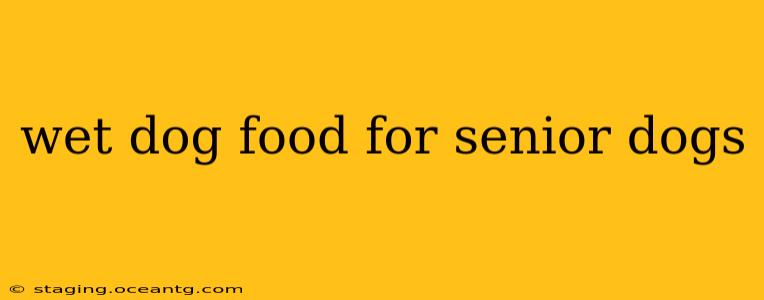Senior dogs have unique nutritional needs that differ significantly from their younger counterparts. As dogs age, their metabolisms slow down, their digestive systems can become more sensitive, and they may experience decreased appetite or changes in taste preferences. Choosing the right wet dog food is crucial for maintaining their health, vitality, and overall well-being during their golden years. This comprehensive guide will help you navigate the world of senior dog wet food, addressing common concerns and providing valuable insights.
What Makes Wet Dog Food Ideal for Senior Dogs?
Wet food often boasts a higher moisture content compared to dry kibble. This is particularly beneficial for senior dogs who might struggle with dehydration, a common issue among older canines. The added moisture can also make digestion easier, reducing the strain on their potentially compromised digestive systems. Many senior dogs find the softer texture of wet food more palatable, especially those experiencing dental issues or decreased chewing ability. The increased palatability can help ensure they consume enough calories to maintain a healthy weight.
What to Look for in Senior Dog Wet Food
Choosing the right wet food involves considering several key factors:
Nutritional Content:
- High-Quality Protein: Senior dogs need a good source of protein to maintain muscle mass, which naturally declines with age. Look for foods with named meat sources like chicken, beef, or fish listed as the primary ingredients. Avoid vague terms like "meat by-products."
- Healthy Fats: Essential fatty acids like omega-3 and omega-6 are crucial for maintaining a healthy coat, skin, and cognitive function. Look for sources like salmon oil or flaxseed oil.
- Limited Carbohydrates: Senior dogs often have reduced tolerance for carbohydrates. Opt for foods with lower carbohydrate content and higher protein and fat levels to provide sustained energy without overloading their system.
- Added Nutrients: Many senior dog wet foods are formulated with added nutrients like glucosamine and chondroitin, which support joint health – a common concern in older dogs. Look for these added benefits if your dog exhibits joint stiffness or arthritis symptoms.
- Fiber: Adequate fiber helps support healthy digestion and can prevent constipation, a common problem in senior dogs.
Ingredients to Avoid:
- Artificial colors, flavors, and preservatives: These additives can be irritating to sensitive digestive systems and offer no nutritional value.
- Fillers: Ingredients like corn, wheat, and soy offer minimal nutritional benefit and can fill up your dog without providing necessary nutrients.
- By-products: These are less desirable parts of an animal and should be avoided in favor of whole-meat ingredients.
What are the benefits of wet dog food for senior dogs with dental problems?
Senior dogs often develop dental issues, leading to pain and difficulty chewing. Wet food's soft texture is significantly easier on sensitive teeth and gums, making mealtimes less stressful and more enjoyable. This ensures they receive the necessary nutrition without the added discomfort of chewing hard kibble.
How much wet dog food should I feed my senior dog?
The amount of wet food you should feed your senior dog depends on factors like breed, size, activity level, and overall health. Always follow the feeding guidelines on the product packaging and adjust as needed based on your dog's weight and body condition. Consult your veterinarian for personalized recommendations to prevent both overfeeding and underfeeding.
Are there specific wet dog food brands recommended for senior dogs?
Many reputable pet food brands offer senior-specific wet food formulations. However, it's crucial to read labels carefully and compare ingredients to find a food that best suits your dog's individual needs and any specific health concerns. Your veterinarian can offer valuable guidance in selecting the most appropriate brand and formula for your dog.
Can I mix wet and dry food for my senior dog?
Mixing wet and dry food can be a good way to increase your senior dog's water intake and enhance the palatability of their meals. However, be mindful of the overall caloric intake to avoid weight gain. Consult your veterinarian for guidance on the appropriate ratios of wet and dry food.
Choosing the right wet food is a crucial aspect of providing optimal care for your aging canine companion. By focusing on high-quality ingredients, appropriate nutrient levels, and considering your dog's specific health needs, you can ensure they receive the nutrition they need to enjoy their senior years to the fullest. Remember to consult your veterinarian for personalized advice and regular check-ups to maintain your senior dog's health and well-being.
